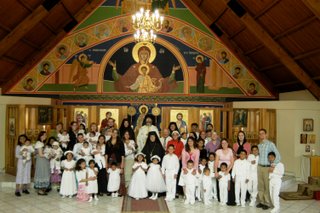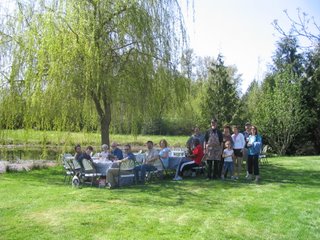
Glory be to God,
I have just returned from a life changing trip to an orphanage in Guatemala city, Guatemala.
This orphanage is run by four God-fearing Orthodox nuns. The founding nuns used to be Catholic monastics, but they became dissatisfied with thier church, and durring a tour of the Holy Land, discovered Orthodoxy, and converted, much to the Catholic church's dismay.
When they decided to start a convent in Guatemala, little did they know that God had greater plans then they could have imagined!
"What do we know about children?" Mother Ines asked when they inherited an orphange and 30 children. But thank God, through thier example, it is evident that all one needs to raise children, run an orphange, or build a church is Faith and Love. These nuns may never have learned how to raise a child, but through the Grace of God, all of the children of the orphanage are happy, healthy, and well adjusted!

There are about 90 children in the orphanage, run 100% on donations. Of course the nuns cannot run everything all the time. They have a hired staff of nannys, cooks, nurses and gardeners, but the present team of staff has taken a long time to perfect. Mother Ivonne told us that it is very difficult to find someone that does not "steal, cheat and lie in this city." Thank God, after several years of hirings, and firings they have a team that they can trust, and even some have become Orthodox!
As the orphange does not have a priest of it's own, right now, it is a great thing when a team like ours visits, and brings a priest along! Durring our stay, we celibrated the Devine Liturgy two times a week. And on one very exciting ocassion, we had a Devine Liturgy along with 26 baptisms! Imagine all those brand-new souls! And the nuns alowed us, the missionaries to be Godparents of the newly-illumined! "The only condition to being a Godparent," said Mother Yvonne, "is that you must pray for your God child every day of your life. That's it!"
The mothers love thier children, and take every precaution for thier well-being as any mother would for thier own children. On Sundays, the children get to watch a movie that has been pre-screened by Mother. Some of the older children have started a book club, they recently finished reading "The Lion the Witch and the Wordrobe." Mother took a group of the children to the theater to see the new motion picture based on the book. The children get plenty of excercise. The orphanage has a pool, inwhich the boys have to do 40 laps before they go to bed everynight, while the girls play soccor in the gym, or do some other constuctive activity.
The older boys are now helping to constuct a new church for the monestary, and new dormatories for the children, so that eventualy the children can move out of the dreadful city, and into the cleaner, safer country side.

The country-side is beautiful! Some of the nuns live out there, inorder to discourage robbers from comming onto the land. Along with buildings for the orphanage, the boys are also helping build a brand new church for the monestary. This will be the very fist original Orthodox church in the country of Guatemala!
These nuns are having it build right...
 thier architect studied Byzantine architecture inorder to construct this church exactly the right way! In the country, at the monestary, the nuns are also raising fish and rabbits to feed the children.
thier architect studied Byzantine architecture inorder to construct this church exactly the right way! In the country, at the monestary, the nuns are also raising fish and rabbits to feed the children.Its a miracle, the fact that the
 children are
children are happy and well fed and dressed. Most of them have come from terrible, violent or abusive back-grounds, and would not be expected to behave in society after thier experiences.
happy and well fed and dressed. Most of them have come from terrible, violent or abusive back-grounds, and would not be expected to behave in society after thier experiences.But the children love one another. Even the children that are not siblings treat one another as if they were brother and sister. The older children look out for the younger ones. And the younger ones look up to the older ones. The children go to church two times a day, and durring the year they have school. Almost all of the children can read and write and tell the time, which is much more then they could have hoped for out on the streets.


The children that are able, make prayer ropes and sell them at the book store, or at fund raisers. The orphanage keeps track of who's ropes are sold, and half the money goes directly to the child. This way, the children begin to save up some money for when they grow up. Some children already have as much as $1,000 in thier account!
While we were there, we got to take the children on an outing outside of the orphange!
 No one is allowed outside the walls of the orphanage without a blessing from Mother. The city is full of violence and poverty, therefore, one must be very cautious, venturing out into the city. Some of the children have only left the orphanage a few times in thier life. So for many of the children, leaving the monestary was very exciting.
No one is allowed outside the walls of the orphanage without a blessing from Mother. The city is full of violence and poverty, therefore, one must be very cautious, venturing out into the city. Some of the children have only left the orphanage a few times in thier life. So for many of the children, leaving the monestary was very exciting.Our outing included a visit to the hot pools, which are heated by the local volcano, then a visit to the monestary, to look at the new church and the fish and rabbits. Then, the children's favorite part: dinner at "Pollo Compero" which is sort of like the KFC/Mc.Donald's of Guatemala. It seemed like some of the kids had never eaten fried chicken before! they eat every last bit of meat off those bones, and used up about a bottle of ketchup each!

It was such a pleasure to watch the children enjoy thier food, and be excited about simple things like feeling the breeze in thier face, as we drove down the street.
Glory to God for All things!
and God bless the struggling people of Guatemala....
for more info on the orphanage, you can visit: www.hogarafaelayau.org
or email me (sarah gillis) at: icecreamwithafork[at]yahoo.com



 The kids exploring on Fr.'s land!
The kids exploring on Fr.'s land!

